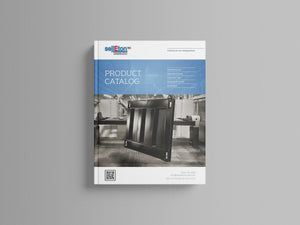
Top Scale Maintenance Tips to Ensure Accuracy and Longevity
Struggling with inaccurate readings or frequent breakdowns of your scales? Read on for essential scale maintenance tips that will help you keep your equipment accurate and extend its life. From regular cleaning to proper calibration, discover the steps you need to maintain your scales effectively.
Key Takeaways
-
Regular cleaning and visual inspections are essential for maintaining the accuracy and longevity of scales, preventing malfunctions caused by dust and wear.
-
Calibration is critical to ensure accurate measurements and compliance with industry regulations; scales should be calibrated regularly using known weights.
-
Preventing overloading, ensuring proper grounding, and maintaining stable placement are vital practices that protect scales from damage and guarantee precise readings.
Regular Cleaning
Regular cleaning is vital for the accuracy and longevity of your scales. Dust and debris can quickly lead to inaccurate readings and malfunctions. Clean your scales after each session using soft brushes, compressed air, and vacuum cleaners to effectively remove dust and dirt.
Moisture can harm scale accuracy. Avoid water or cleaning liquids that may damage electronic components. Use a damp cloth for the surface and keep water away from the load cells to protect the scale’s functionality.
Incorporating regular cleaning into your maintenance routine prevents harmful debris and moisture build up, enhancing the health of your scales. Clean scales perform better and last longer, saving time and money on repairs and replacements.
Visual Inspection
Regular visual inspections are crucial for maintaining your scales. A quick guide to identifying signs of wear and tear early prevents significant problems. Technicians often catch minor issues like loose components or improper alignments that could lead to critical equipment failures. These details help ensure optimal performance.
A standardized checklist for visual inspections enhances effectiveness. It should include checking for load cell damage and binding, inspecting the junction box for damage and cleanliness, and ensuring scale feet are intact and properly fitted. Regular stability checks prevent inaccuracies caused by uneven surfaces or unstable placements.
Regular visual inspections in your regular maintenance routine help proactively address issues, ensuring your scales remain accurate and reliable. This practice extends equipment life and maintains client trust through consistent performance, including regular inspection.
Calibration
Calibration is crucial for maintaining accuracy in weighing equipment. Key points include:
-
Scales can lose accuracy over time, but regular calibration prevents this.
-
Using known weights, preferably calibration weights, ensures accurate readings.
-
Calibration helps maintain compliance with industry standards.
Accurate calibration:
-
Prevents costly manufacturing errors and legal issues.
-
In regulated sectors, maintaining calibration reports demonstrates compliance and accountability.
-
Should be performed after any repairs or adjustments to ensure scales calibrate correctly.
Industrial weighing scales should be calibrated upon installation to guarantee initial accuracy. Regular calibration identifies deviations early, allowing prompt adjustments and preventing long-term inaccuracies. This ensures reliable measurements consistently.
Professional scale service includes thorough calibration, ensuring precision and reliability. Investing in regular calibration maintains scale accuracy, ensures compliance with industry regulations, and avoids potential legal complications.
Proper Grounding
Proper grounding protects electronic scales from voltage fluctuations and lightning strikes. Follow the manufacturer’s grounding instructions to ensure safety and reliability. Maintain load cell cables and grounding components to ensure accurate readings and prevent costly repairs.
Regularly inspect grounding components as part of your maintenance routine. Key reasons to do this include:
-
Ensuring grounding connections are secure
-
Keeping connections free from corrosion
-
Maintaining scale stability and accuracy
-
Safeguarding your weighing equipment investment
Avoid Overloading
To maintain scale accuracy and longevity, avoid overloading by following these guidelines:
-
Understand and adhere to the manufacturer’s weight limits.
-
Avoid shock loading or sudden dumping of heavy objects onto the scale.
-
Prevent damage to load cells, which can lead to faulty readings and costly repairs.
Mechanical stops in load cells prevent excess pressure, while shock absorbers protect against sudden impacts. Software alarms alert operators when the weight approaches the load cell’s limit, preventing accidental overloading.
Adhering to weight limits prevents unnecessary scale damage, ensuring accuracy and reliability. This practice extends equipment life and results in significant cost savings by avoiding costly repairs and downtime with a weighing device, as well as preventing issues related to inaccurate weights.
Placement and Stability
Proper placement and stability are fundamental for accurate measurements. Place weighing scales on flat, stable surfaces, away from vibrations and disturbances. Inappropriate placement can lead to incorrect readings, affecting reliability.
Ensure all legs of the weighing scale firmly touch the ground to maintain stability. Use the leveling bubble to determine proper alignment, ensuring consistent and accurate measurements to weigh.
Paying attention to placement and stability prevents errors and ensures reliable readings. This simple yet effective practice is crucial for proper maintenance, contributing to the overall accuracy and careful longevity of your scales.
Battery Maintenance
Battery maintenance prevents downtime and ensures continuous power for digital scales. Store batteries at around 50% charge during idle periods to maintain optimal performance. Check stored batteries every six months to ensure they remain charged and functional, preventing unexpected power failures.
Following manufacturer instructions for battery maintenance extends battery lifespan and ensures reliable operation of your digital scales. Proper battery maintenance is a simple yet effective way to maintain the accuracy and reliability of your weighing equipment.
Documentation and Record Keeping
Thorough records of calibrations and maintenance activities demonstrate compliance and accountability. Proper documentation serves as vital evidence for audits and ensures adherence to industry standards. Regularly updating maintenance records can identify performance trends and prevent future issues.
Calibration records should include the date, standards used, and outcomes of each calibration. Accurate record-keeping establishes traceability for measurement results, crucial for quality assurance.
Regular professional maintenance helps companies comply with industry regulations regarding equipment accuracy and correct operation.
Professional Scale Service
Regular professional scale service maintains the accuracy and performance of your weighing equipment. Technicians inspect equipment before any work to identify and address potential issues. Scheduled cleaning routines extend the lifespan of your weighing equipment, contributing to overall cost savings. Our services ensure that your equipment remains in optimal condition, including rice lake weighing systems.
On-site service allows for immediate troubleshooting and adjustments, minimizing downtime and keeping your scales in peak condition. Investing in regular professional servicing ensures reliable and accurate solutions, supporting smooth business operations.
Summary
In conclusion, proper maintenance of weighing equipment is essential for ensuring accuracy and longevity. Regular cleaning, visual inspections, calibration, grounding, and avoiding overloading are all critical practices that contribute to the reliability of your scales. By following these tips, you can prevent costly repairs and downtime, ensuring that your logistics operations run smoothly and efficiently.
Investing in professional scale service and maintaining thorough documentation and records further enhances the performance and compliance of your weighing equipment. By prioritizing proper maintenance, you can ensure that your scales remain accurate and reliable, supporting the success of your business.
Frequently Asked Questions
How often should I clean my scales?
Scales should be cleaned after every loading and unloading session to prevent the buildup of dust and debris. Regular maintenance ensures accuracy and longevity of the equipment.
What should I look for during a visual inspection?
During a visual inspection, it is essential to look for signs of wear and tear, loose components, improper alignments, and damage to critical parts such as load cells and junction boxes. This thorough check ensures the integrity and functionality of the equipment.
How frequently should I calibrate my scales?
To ensure accuracy, scales should be calibrated regularly, particularly after repairs or adjustments, and immediately upon installation for industrial scales.
Why is proper grounding important for electronic scales?
Proper grounding is crucial for electronic scales as it safeguards against voltage fluctuations and lightning strikes, thereby preventing damage and ensuring consistent performance.
What are the benefits of professional scale service?
Professional scale service provides accurate measurements, reduces potential repair costs and downtime, and ensures compliance with industry standards. This ultimately enhances operational efficiency and reliability.

